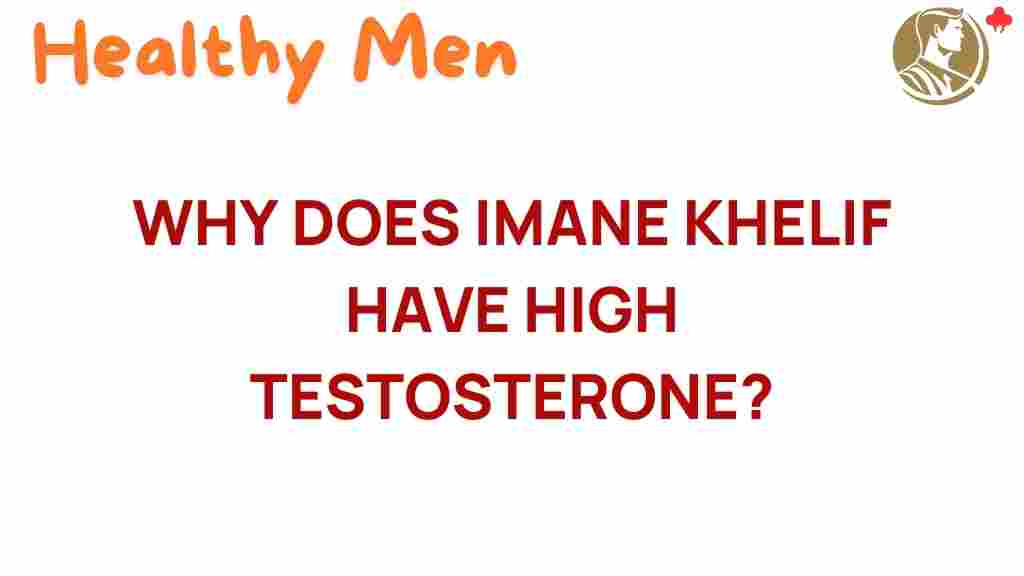Unraveling the Mystery: Why Does Imane Khelif Have High Testosterone?
In the realm of sports and fitness, the conversation around hormones, particularly testosterone, has sparked curiosity and debate. One athlete who has recently drawn attention for her high testosterone levels is Imane Khelif. Understanding the implications of high testosterone in athletes is crucial for grasping how it affects performance, health, and overall fitness. This article delves into the mystery surrounding Imane Khelif’s health and performance as an athlete with high testosterone, exploring the biological, fitness, and hormonal factors at play.
Understanding Testosterone
Testosterone is a hormone that plays a pivotal role in the body, influencing various functions, including:
- Muscle growth and strength
- Bone density
- Fat distribution
- Red blood cell production
- Sex drive and reproductive health
For athletes, testosterone is often associated with enhanced performance, making it a subject of both interest and controversy in sports. High testosterone can lead to increased muscle mass, improved endurance, and faster recovery times, which are all advantageous for competitive athletes.
Imane Khelif: A Profile
Imane Khelif is a notable athlete who has garnered attention not only for her skills in her sport but also for her unique physiological traits. As an athlete, she embodies the intersection of biology and performance, showcasing how high testosterone can influence one’s capabilities on the field or in the gym. Her journey highlights the complexities of hormones in athletic performance.
How High Testosterone Affects Performance
When exploring why Imane Khelif has high testosterone, it’s essential to understand the potential benefits and drawbacks of this condition, particularly in the context of her athletic performance.
Benefits of High Testosterone in Athletes
Athletes with high testosterone often experience several advantages:
- Increased Strength: Higher testosterone levels contribute to greater muscle mass and strength, enabling athletes like Imane Khelif to perform at peak levels.
- Enhanced Recovery: Testosterone aids in muscle recovery post-exercise, allowing athletes to train harder and more frequently.
- Improved Endurance: Elevated testosterone can lead to increased stamina, benefiting athletes in endurance sports.
- Boosted Motivation: Testosterone has been linked to increased aggression and motivation, which can enhance competitive performance.
Potential Drawbacks of High Testosterone
While high testosterone can provide significant advantages, it also comes with potential drawbacks:
- Health Risks: Elevated testosterone levels, particularly when artificially increased through supplementation, can lead to health issues such as cardiovascular problems and liver damage.
- Regulatory Scrutiny: Athletes with high testosterone levels may face scrutiny from sports organizations regarding eligibility and fairness in competition.
- Mood Fluctuations: High testosterone can sometimes lead to mood swings and aggressive behavior.
The Biology Behind High Testosterone
The question of why Imane Khelif has high testosterone levels can be answered through various biological factors:
Genetics
Genetics plays a substantial role in hormone levels. Some individuals naturally produce more testosterone due to genetic predisposition. This can affect an athlete’s performance significantly, as seen in Imane Khelif’s case.
Training and Environment
The training environment can also influence hormone levels. Intense training regimens can boost testosterone production, which is often seen in athletes who push their limits regularly. Imane Khelif’s rigorous training could be a factor in her elevated levels.
Nutrition
Athletes often have specific nutritional needs that can impact hormone production. Diets rich in healthy fats, proteins, and micronutrients can support optimal testosterone levels. Imane Khelif’s nutrition regimen likely plays a crucial role in her hormonal balance.
Step-by-Step: How to Assess and Manage High Testosterone
If you’re an athlete or simply interested in understanding high testosterone better, here’s a step-by-step guide to assess and manage this condition:
Step 1: Get Tested
The first step to understanding your testosterone levels is to get tested. Consult with a healthcare provider to conduct hormone level testing, including testosterone.
Step 2: Evaluate Symptoms
Monitor for symptoms associated with high testosterone, such as:
- Increased muscle mass
- Changes in mood or aggression
- Acne or skin changes
- Changes in libido
Step 3: Consult a Specialist
Work with a healthcare provider or an endocrinologist who specializes in hormones to interpret your results and symptoms effectively.
Step 4: Adjust Training and Nutrition
Based on your assessment, you may need to adjust your training regimen or nutrition. Incorporate:
- Strength training
- Balanced nutrition
- Rest and recovery protocols
Step 5: Regular Monitoring
Regularly monitor your hormone levels and overall health to ensure that your testosterone levels remain within a healthy range. This is crucial for maintaining athletic performance and overall well-being.
Troubleshooting High Testosterone Levels
For athletes like Imane Khelif, navigating high testosterone levels can be challenging. Here are some troubleshooting tips:
1. Understand Your Body
Recognize that every individual is different. What works for one athlete may not work for another. Tailor your approach based on your unique physiology.
2. Manage Stress
High stress can impact hormone levels, including testosterone. Implement stress management techniques such as mindfulness, yoga, or meditation.
3. Balance Training Intensity
Overtraining can lead to hormonal imbalances. Ensure your training program includes adequate rest and recovery periods to prevent burnout.
4. Consider Professional Guidance
If you’re unsure how to manage your testosterone levels, consider working with a sports nutritionist or a coach who has experience with hormonal health.
Conclusion
High testosterone levels in athletes like Imane Khelif present a complex interplay of biological, nutritional, and training factors. While high testosterone can offer significant performance benefits, it also requires careful management to avoid potential health risks. Understanding the role of hormones in fitness and health is crucial for athletes aiming to optimize their performance responsibly.
For those interested in exploring more about hormone health and fitness, consider visiting this resource for further reading. Whether you’re an athlete or a fitness enthusiast, knowledge is power when it comes to understanding how your body functions.
By unraveling the mystery of high testosterone, we can appreciate the unique capabilities of athletes like Imane Khelif and the science behind peak performance.
This article is in the category Conditions and created by healthymen Team
